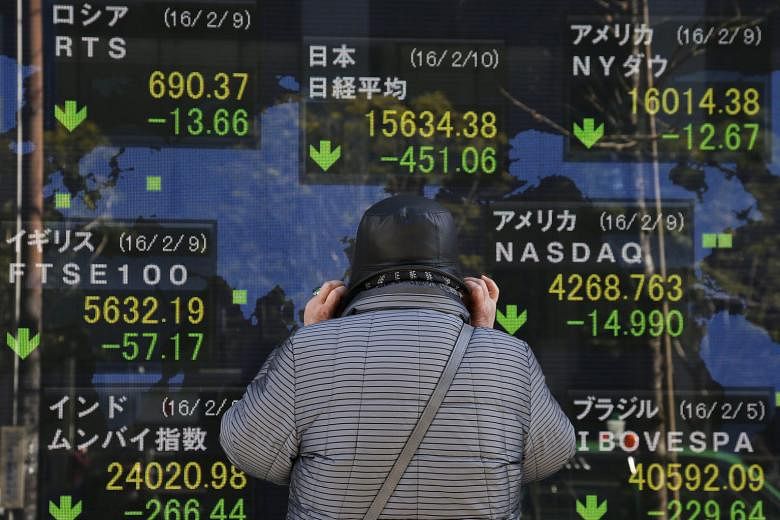The stock market blood-letting continued yesterday, with fears over the global banking sector the latest concern propelling rattled investors to the exits.
There had been hope that the Chinese New Year closure of China's turbulent markets would bring a measure of calm elsewhere but that notion was shot down yesterday.
There was carnage just about everywhere, with Japanese shares falling to their lowest level since October 2014 after losing 0.2 per cent yesterday following the 5.4 per cent hammering they took on Tuesday.
Banking stocks in Tokyo have been hit particularly hard since the central bank introduced negative interest rates, a move that makes it tough for banks to hold on to deposits and maintain interest margins.
Australia, which has been steadily declining since the start of the year, dropped into a bear market after declining 1.2 per cent yesterday.
The gloom infected Singapore's market, which reopened for trading yesterday after the Chinese New Year break only to plunge straight into the red.
Local shares fell as much as 3 per cent before recovering some ground to end the day 1.57 per cent, or 41.11 points, lower at 2,582.1 and down 10.4 per cent for the year.
Blue chips were battered, with commodity plays and property developers leading losses.
"The whole global climate is tough. The only consolation we have is that China is still closed," said remisier Desmond Leong.
"I think that Singapore is trying to rebound - we've had a couple of days in the past few weeks where the market pushed up. The market has reached levels where there are buyers wanting to come in, but the global climate is just so challenging that people are still afraid."
Over the past week, stocks across the world have been hammered on worries about the banking sector, not just in Japan but the euro zone as well, where loose monetary policy in the wake of the 2008 financial crisis has crimped bank profits.
On Wall Street, the Standard & Poor's 500 Index ended Tuesday near its lowest since April 2014 while the Nasdaq Composite Index edged closer to a bear market amid declines in energy and technology shares.
Furthermore, underlying concerns about an economic slowdown in China and the fragile US recovery have not disappeared, noted Mr Russ Koesterich, global chief investment strategist for New York-based BlackRock.
"Contributing to the drop in oil and certainly having a large impact on the drop in equities is this growing concern about the sustainability of the recovery, the state of economic growth in China and increasingly the state of growth in the US," he said in an interview with Bloomberg TV. "People are getting worried about the global recession, worried about growth, which is affecting not only oil and stocks but other risky assets as well."
Oil actually snapped a four-day losing streak on Tuesday night, rebounding from the lowest close in almost three weeks as crude producers reduced spending plans.
Oil futures gained as much as 2.5 per cent in New York after slumping 13 per cent in the previous four sessions, but are still down about 23 per cent this year.


